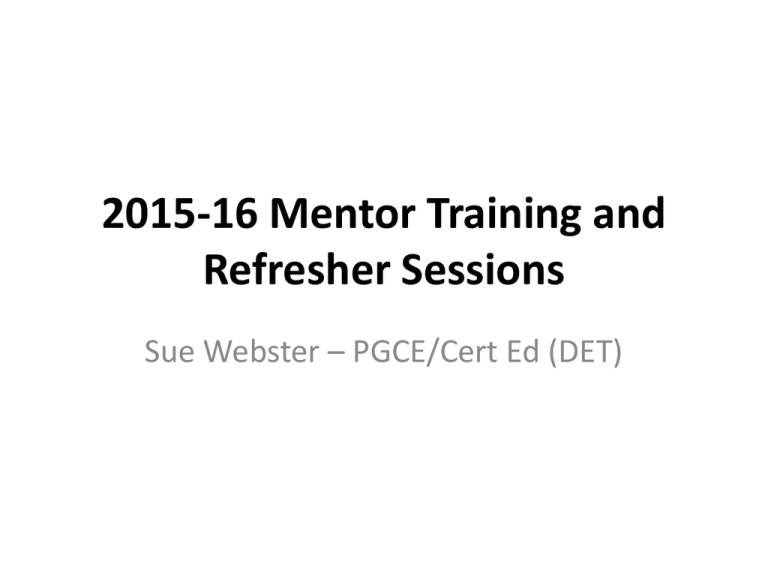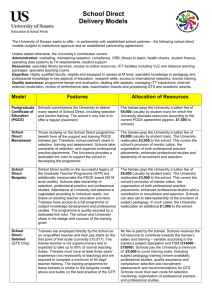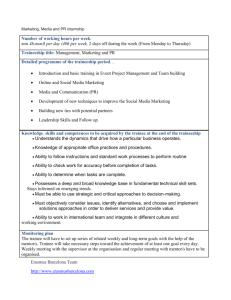2015 16 Mentor Training and Refresher Sessions
advertisement

2015-16 Mentor Training and Refresher Sessions Sue Webster – PGCE/Cert Ed (DET) Introductions Changes Mentoring role PGCE/Cert Ed (DET) programme design Current topics Introductions Introductions Plymouth teaching team: Sue Webster (Centre Tutor and University Placement Coordinator), Wendy Lambert-Heggs and Simon Webster Russell Shobrook (Deputy Programme Lead) and Denise Summers (Programme Lead) Partner College Placement Coordinators: Nicky Gilmour (PCA), Nicky Hawkins (SDC), Bill Heggs (CCP) Changes Changes for 2015-16 1. Mentors no longer have to sign and set targets on Lesson Plans…please help trainees create their target setting sheet at start of each module, instead. 2. Moved to semesters (September to January & February to June) and electronic submissions and marking. 3. Enh Mod – assessed through completion of a Research Proposal Form, rather than researchbased essay/report. Mentoring role Mentoring role Not based on any one model, but will include coaching, facilitation and being a critical friend. Whether part-time or full-time there are milestones on the Stages and Framework for development of Pre-Service Trainee Teachers (Pre-Service Placement Policy, p.13) which will assist in pacing the transitional phases for trainees. Mentoring role: a focus on… 1. Subject specific pedagogy – trainees’ developing teaching knowledge and skills, and impact on their learners’ learning… 2. The relation between theory and practice – i.e. Theory in Practice; Practice in Theory All mentors have: • Copy of Pre-Service Mentor Handbook (New mentors also have a hardcopy of the PreService Placement Policy) • Support from Partner College/Univeristy Coordinators • Refreshers through updates and meetings • Regular newsletters sent via email • Resources available at POPPI site This start of year mentor meeting is part of the baseline training for new mentors, who will also have a paired observation. Key documents to read Pre-service Mentor Handbook and Pre-Service Placement Policy These contain the intentions, expectations and the legal requirements for safety of learners and trainees, as well as for mentors and teaching staff. All templates and forms are included as appendices. Mentor Observation form The specific Mentor Observation form, focuses on subject specialist pedagogy, knowledge and skills and the impact on learning. Subject specialist practice is graded 1(Outstanding) – 4 (Fail) by mentors. Remaining areas of practice are graded 1-4 at the tutor observations. The grading criteria are on the back sheet of the observation form. Trainee Attendance and Absences For all our trainees: • Trainees are expected to work to their placement timetable and dates, not starting or ending in-line with University terms • Unavoidable absences from placement must be reported verbally. It is the trainee’s responsibility to ensure that this information reaches their personal mentor NB failure of a trainee to inform the placement centre of an absence may be considered as professional misconduct. For new Mentors Review of baseline training: • Read the Pre-service Mentor Handbook • Make sure you have contact details for your centre’s Placement Coordinator • Review the examples on-line at POPPI • Make sure you have a paired observation at the first mentor observation Summary of mentor records • Observations • Hours log • End of Stage 1 and End of Stage 2 reports Help them with target setting, as part of the trainee’s profile, means that they can create professional portfolio that can be used for interviews and constructing CVs later on. Thanks to Wendy Lambert-Heggs for the following two slides: There are many definitions of mentoring/models. Below is a classic example from Maynard, T. and Furlong, J (1993) Learning to Teach and Models of Mentoring, in D. McIntyre, H. Haggar and M. Wilkin (EDS Edition) Mentoring Perspectives on School Based Teacher Education. London: Kogan Page Three Models of Mentoring The Competency Model Here, the mentor takes on the role of ‘systematic trainer’ or coach, with a predetermined list of competencies to tick off. The Apprenticeship Model This notion is of the teacher working alongside an experienced professional, observing but also collaborating (coaching). The Reflective Model The mentor helps the teacher to develop a deeper understanding of student learning by joining them as co-enquirer. The above models will very much depend upon the culture of the organisation and the Trainee’s needs, and each phase of experience for the trainee reflects all models but in varying proportions. Visual representation on transition of trainee/mentee needs over time (Phase) INDUCTION PHASE The competency model FACILITATION/COLLABORATION PHASE The apprenticeship model CONFIRMATION/AFFIRMATION PHASE The reflective model Core structured guidance Support and Advice; mentor/mentee relationship Individual trainee/mentee concerns; professional acceptance PGCE/Cert Ed (DET) programme design PGCE/Cert Ed (DET) programme design 4 modules; each module is worth 30 credits PGCE 30 credits at Level 6 90 credits at Level 6/7 Cert Ed 30 credits at Level 4 90 credits at Level 5 Course modules (FT) Learning, Teaching and Assessment Managing Learning Environments Curriculum and Society Wider Professional & Personal Development Full-time Programme Autumn Term AU Learning, Teaching and Assessment (Core Module Level 4/6 - 30 credits) Managing Learning Environments (Enhancement Module Level 5/7 30 credits) Spring/Summer Term SP Curriculum and Society (Core Module Level 5/7 - 30 credits) Wider Professional and Personal Development (Core Module Level 5/7 - 30 credits) Part-Time Programme Yr 1 Autumn Term AU Learning, Teaching and Assessment (Core Module Level 4/6 - 30 credits) Spring/Summer Term SP Curriculum and Society (Core Module Level 5/7 - 30 credits) Part-Time Programme Yr 2 Autumn Term AU Managing Learning Environments (Enhancement Module Level 5/7 - 30 credits) Spring/Summer Term SP Wider Professional and Personal Development (Core Module Level 5/7 - 30 credits) Practice Overview Each module combines direct and non-direct teaching hours, over a minimum of 30 weeks per year*, averaging 25 hours of direct teaching per module. It is recommended that for FT programme the First module should be approx 30% direct 70% non-direct - which equates to about 8-10 hours direct and 15-17 hours non-direct. *There is a requirement for a minimum of 100 direct and 30 non-direct hours by the end of the programme. Included in these hours, each module requires trainees to be observed in teaching twice: • one x 1hr (minimum) session observed by a subject specialist mentor PLUS • one x 1hr (minimum) session observed by a course tutor Professional Portfolio (PP) Records the collaborative relationship between mentor and trainee, moving towards development of their professional, autonomous practice. Trainees devise targets recorded on the Reflective Development Plan Trainees will need help with target setting Articulation of the impact of a trainee's experience of learners and their learning is what gives the process its evidence: • evaluated observations, • target and review sheet, • evaluated planning materials, • reflections, • breadth of practice and so on. Current topics Maths and English – 16-19 Study Programmes Information from the Foundation: ‘From AUGUST 2014 all 16–19 year olds without A*–C GCSEs in English or Maths must continue to study towards them by enrolling on either GCSE qualifications or approved stepping stone qualifications such as functional skills. From AUGUST 2015 condition of funding revised so all full time 16–19 year olds without prior attainment of Grade D in English or Maths GCSE must be enrolled on GCSE course.’ There is a Study Skills Guide if needed for reference, but main text is: Pears, R & Shields, G (2013) Cite them right (9th edn), Basingstoke: Palgrave Macmillan. This is available to trainees electronically through the University. Titles for our sector and University • Plymouth Institute of Education (PIoE), which is part of the Faculty of Arts and Humanities • PGCE/Cert Ed (DET), i.e. incorporating the Diploma in Education and Training. • Further Education and Skills Sector • Education and Training Foundation (the Foundation) NB IfL is no longer functioning, with their remit and duties transferred to the Foundation. QTLS remains a legislated status. Ofsted Ofsted visited ITTE at Plymouth University at the end of 2014. Thank you to everyone who supported that event! Result was Grade 2 overall, with one of the three separate graded areas at Grade 1. The intention is to maintain and build on this result for the next visit.







